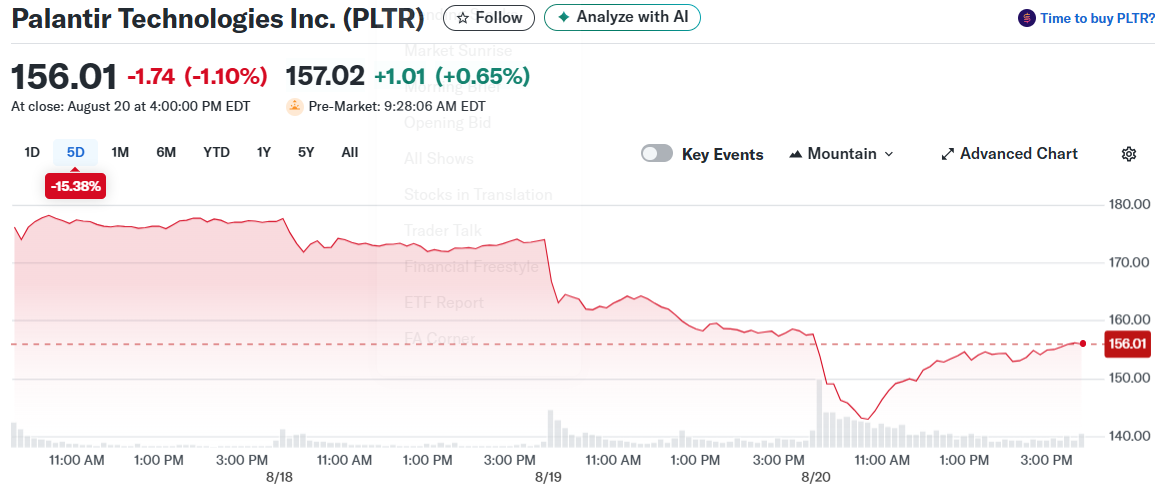TLDR
- Palantir stock dropped 17% over six sessions, erasing $73 billion in market value while short sellers profited $1.6 billion
- High-profile short seller Andrew Left called $40 per share “generous” compared to OpenAI valuation metrics
- The decline came after a 442% surge earlier in the year, highlighting risks for high-growth tech stocks
- No major corporate announcements drove the sell-off, suggesting macroeconomic factors were at play
- Short selling activity reinforced negative sentiment and extended downward pressure on shares
Palantir Technologies (PLTR) stock suffered a brutal decline over six trading sessions. The data analytics company lost 17% of its value during this period.

The selloff erased approximately $73 billion in market capitalization. Short sellers capitalized on the decline, generating estimated profits of $1.6 billion.
This dramatic fall came after Palantir’s impressive 442% surge earlier in the year. The reversal highlights the volatile nature of high-growth technology stocks.
Short Seller Criticism Fuels Decline
High-profile short seller Andrew Left from Citron Research targeted Palantir’s valuation. Left argued that even $40 per share would be “generous” for the company.
He compared Palantir unfavorably to OpenAI’s valuation metrics. Left claimed Palantir is “disconnected from fundamentals” and trading beyond realistic expectations.
The criticism resonated with investors already questioning tech stock valuations. Rising interest rates have made speculative growth investments less attractive.
No company-specific news triggered the initial decline. This suggests macroeconomic factors drove the selling pressure rather than operational issues.
Palantir’s AI and data analytics platforms serve over 40 industries. The company’s technology spans from national security to healthcare and finance sectors.
Despite reporting strong earnings earlier this month, investor sentiment shifted quickly. The rapid change demonstrates how momentum can work both ways for growth stocks.
Market Pressures Mount
The broader tech sector faces increasing scrutiny over inflated valuations. Investors are demanding more concrete earnings growth rather than relying on future promises.
Palantir’s challenge involves proving its long-term value proposition. The company must demonstrate consistent revenue growth to justify premium pricing.
Short selling activity reinforced the negative sentiment surrounding the stock. Bearish positions extended the downward pressure beyond initial selling.
The situation draws comparisons to previous high-profile short selling events. Tesla and GameStop experienced similar coordinated bearish attacks in recent years.
Regulatory authorities have taken notice of the parallels. The concentrated short interest has raised questions about market manipulation.
Founded in 2003 by Peter Thiel and Alex Karp, Palantir originally served intelligence agencies. The company has since expanded into commercial markets with its Gotham and Foundry platforms.
The recent decline serves as a reality check for speculative tech investments. Risk management becomes crucial as market conditions shift toward fundamentals.
Analysts suggest this selloff could signal broader trouble for momentum-driven tech stocks. The AI boom may be cooling as investors focus on actual profitability rather than hype.
The stock’s future performance will depend on Palantir’s ability to deliver consistent results. Revenue growth and customer expansion remain key metrics for long-term success.






